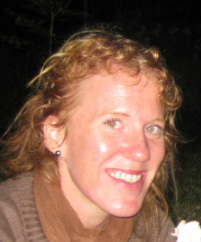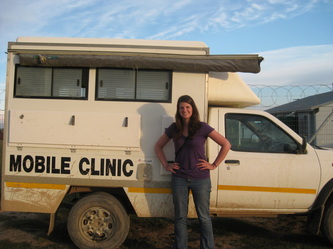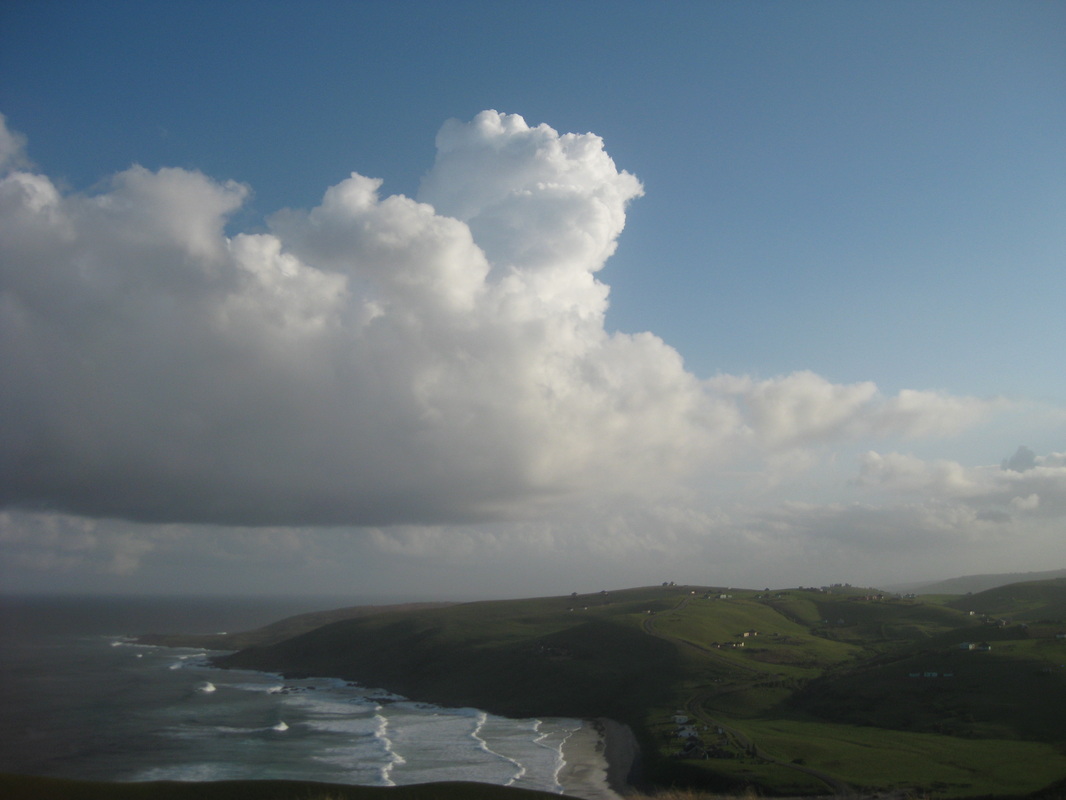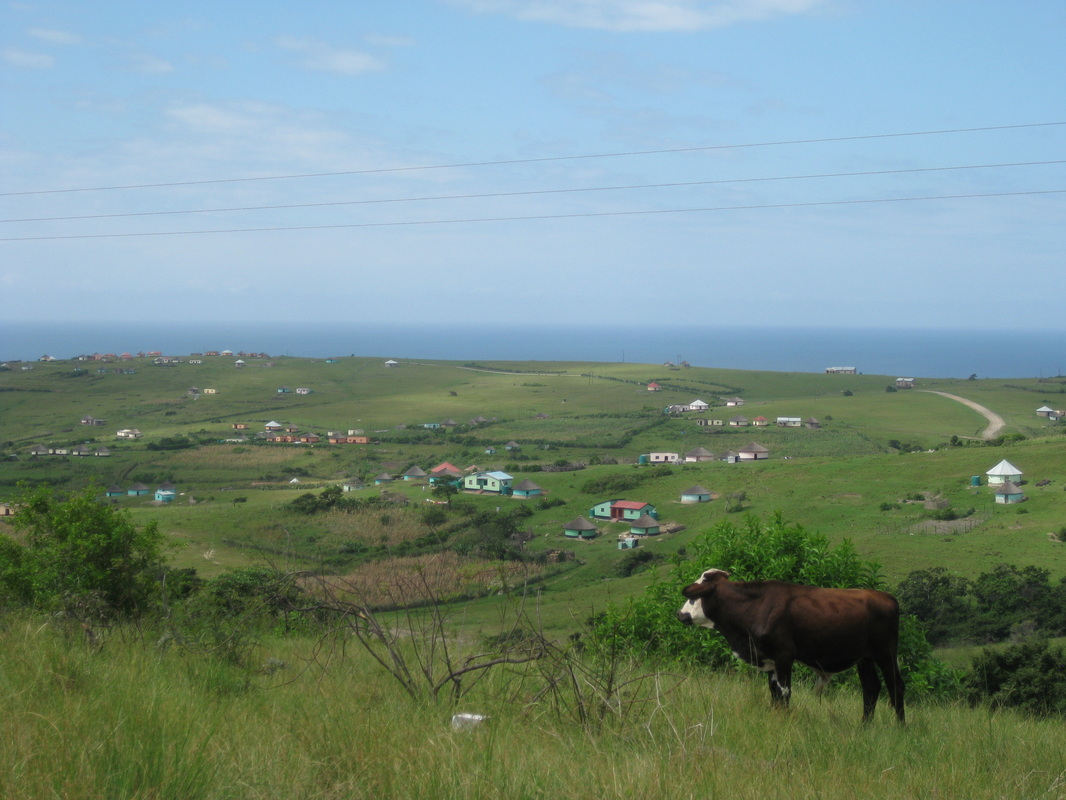|
Zithulele is an amazing place and we are glad to be here. Our names are Lena (20) and Vanessa (19) and we finished school in june. We know the Jabulani Foundation through our School in Stuttgart (Germany). Last Year we had a project to collect money for a water tank for the Pre-School of Zithulele.
This project made us excited and so we wanted to know more about the work of Jabulani and the life in South Africa. We liked the work, and this is why we wanted to help as volunteers for a few months. We arrived at the end of August, excited about the people, South African culture and our work place. We live in the student house with other volunteers or medical students. I (Vanessa) help axium with teaching maths from grade 7 to 10, and I (Lena) work in the Pre-School of Zithulele. We enjoy our work with the children, it is fun to see how they learn new things. Furthermore we like to prepare the Arts and Crafts lesson for the Pre-School on Tuesdays and Thursdays. For me (Lena) it is a good chance to get more experience as a teacher because at home I am going to start university to become a teacher. Next to the lessons in school we try to help where help is needed, mostly in the Library or hospital office. We also had a Science Fair for kids at the Community Centre of Zithulele. We showed the kids some experiments, explained how certain things work and enjoyed the drinks and food. We hope that the kids are more excited about science now. We really enjoy our time here, meet new people from everywhere, get to know the South African culture and experience the great hospitality. We are grateful for the opportunity to be here, improve our english, learn some words in xhosa, make new friends and be a part of Zithulele. In our free time we like to travel around and enjoy the beaches on the Wild Coast. Our lifestyle at home is very different to the way how people live here. We would like to take the south African relaxed life style home to germany.
2 Comments
Today I had an email from one of the other volunteers asking for phrases we use at the clinic, as she is trying to make a Xhosa phrasebook for volunteers that come and go, which I thought was such a good idea! When we got here we floundered around and got laughed at a lot, and knowing just a few basic words and phrases would have helped.
I'm sure emily has already given you the first lesson, but here's a little more isiXhosa, mostly words that I've found really important. (Spelling is my own personal phonetics) 1. Ndilambile - I'm hungry! Yes that is number one on my list, as food is a large part of my life. And as I'm waiting for dinner to cook right now, it's even more on my mind than usual. 2. Hamba eh festile ni amayheza - go to the pharmacy. The number of people that come to us when they should be at the pharmacy is crazy! Wednesdays and thursdays (Zithulele clinic days) we get flooded with patients in the wrong place. 3. Upambeni wena - you crazy! A particularly important phrase when talking to Asanda, one of the best councillors and translators you will ever meet. She is so funny, but also really nice and will always help you expand your vocab. 4. Kushushu namhlanje - it's hot today. It's rained for the past week and everything is muddy, so that's more of an optimistic phrase now than it normally is. 5. Zimbini gabini ingamini - take 2 twice a day. Only applies when your dispencing medicine, but I love saying it. IsiXhosa is quite a fun language at times. 6. Mgcomgcomi - mosquito! Often accompanied by swear words, but I don't need to teach you those now. A mosquito net is essential down here. I actually know a lot more, which surprises me, but that's it for now. People here are always so impressed when you know a little isiXhosa; they smile and often laugh at you, but it's good fun. Today I said bless you in isiXhosa and everyone in the room laughed at me, but then I was told I have a good brain (they needed sign language for that one) so I'm certain I said the right words. I've only made one real mistake, and that was misusing 'wamkelekile' - welcome. I used it as a reply to thankyou, as we do in english, but here it's only used in the context of 'welcome to my home/office etc'. I was laughed, more than usual, and now only use it when appropriate. It's a learning experience, but one I'm enjoying.  Ok, one picture: Dr, Guro Stokke Hello again! I’ve decided to write this post about my experiences one morning in the Maternity Ward of Zithulele Hospital. Don’t worry; I won’t be including any pictures this time. September is the most hectic month for deliveries in Zithulele, almost entirely due to the fact that it is nine months after the December holidays, when the men come home from the mines. It strikes me that there will be a lot of fathers coming back to Zithulele soon to the joys of 3-month old babies, the women already having done most of the heavy lifting. Dr. Guro Stokke is the super woman in charge of delivering all of these babies, looking after them and their mothers until they are discharged. Watching her with the mothers in labor, it is visible how much relief and comfort they take in her knowledge and expertise. In addition to this, Guro takes extra care to comfort the mothers and try to explain what is going on, though there is a significant language barrier as most of the mothers do not speak any English, Guro does not speak much Xhosa, and English isn’t even her first language (being from Norway). (Side note- the most frequently heard Xhosa word in the labor ward is “tyhala!” In English, “push!”) This extra effort is so important. I’ve been aware of many of the terrors of birth before now (and the joys), but before witnessing my first birth I never fully appreciated the enormous anxiety that mothers experience, especially new mothers. Lying on a hospital bed, mothers feel all of the pain and do all of the work, but don’t have any view, control, or specialized knowledge of what is going on. The first mother I watched give birth last Friday started bleeding during her contractions. In fear of the placenta completely rupturing before the baby as born, everyone whirled into action- a clipboard was shown to the mother and she was told that she needed to have an operation to get the baby out and she had to sign. She looked so scared! Immediately wheeled into the operating room where everything was prepared for a c-section, everything changed again once she was there. Suddenly the baby was on its way out, making the c-section unnecessary and the mother was told to push push push instead! Everything went smoothly from that time on, but I cannot help dwelling on how confusing and scary it must be for the mother to know something is wrong (but not what or how severe), be wheeled in for an operation, and then told to push again instead. Even with an effort being made to explain everything to her, I’m sure she did not fully understand what was going on, especially as it happened so quickly. The second and third births I saw that day did not require (or almost require) c-sections, but both had their own trials as well. Both came almost at the exact same time, and when the second was born it needed the oxygen tank that was still in the room next door. The mother saw her baby whisked away from her in a hurry into another room, where the doctors (rightly) devoted all of their attention to the child for a long while to make sure that everything was ok. During this time what must have been running through the mother’s mind? Even when reassured by a nurse, she still hasn’t seen her baby alive and well for hours after giving birth. I can’t imagine how scary this all must be or just how important the relationship between doctor and patient is to allaying those fears. Especially in this community, where there is not always a lot of external support for a mother giving birth and many new mothers do not know what to expect when they arrive at the hospital (see the research of two visiting Princeton students on childbirth in the Transkei). The work that the hospital and clinics do to educate women on what to expect before, during, and after birth is invaluable. Mothers leave Zithulele hospital with important knowledge about caring for their children that they might not get anywhere else. Breastfeeding is promoted (though not always accepted), and babies leave the hospital only when they are at a healthy weight and eating properly. In addition to this, the Zithulele Mentor Mothers (another NGO) then follow up with new mothers to make sure that babies progress in a healthy way and mothers are going to follow-up clinic visits. The truth is that these tiny babies are the future of Zithulele (as cheesy and clichéd a statement as that is). There is so much research out there demonstrating that achievement and education gaps start from birth. In a place like Zithulele, where we have some amazingly dedicated and inspiring parents, Mentor Mothers, an ECD program, pre-schools, and Axium educators, some of these babies might be very lucky, might be able to excel despite an impoverished community with an educational system that generally fails its students year after year. Who can say though? Peaking into the rooms of happy mothers and babies it seems a shame that they should ever have to leave the safe confines of the hospital and return to their homes and uncertain futures. Will you be raised by a relative that loves you? Will your mother/grandmother/aunt tell you stories and play games with you? Will you go to preschool and learn to draw and ride a tricycle or go straight into grade R with 40 other kids? Will you eventually learn to read or will you just be pushed through school? How will it all turn out? Babies are a symbol of future hopes and dreams, but the truth is that their future is being built for them now, by the support and options we make available for them from the very beginning. My morning spent in the maternity ward was exciting, happy, at times frightening, but mostly inspiring. Actually, in those respects, it was a lot like many other mornings in Zithulele. -Emily Hi :) I’m Catherine, a volunteer for Jabulani. I know you’ve already had a post very similar to this from Emily (which is why I’m not starting mine with isiXhosa) but I feel I should introduce myself too. I work at the ARV clinic in the hospital, doing a lot of admin for patients that receive their treatment at clinics around the hospital. The Transkei is a poor area of South Africa, and transport is…hectic at the best of times, so by giving patients their ARVs at clinics instead of the hospital they are much more likely to stick with it, and therefore it will work a lot better.
I’m from England, and out here for a year before I go back for university. I was sent here by a charity that works in the UK, called Project Trust, who send gap year students all over the world to work at different teaching and social projects. Zithulele is a special project – both because it is the only medical project they do, and also because it’s just an amazing project. Living here you get to see a whole new culture; I see and speak to (often in very broken English/Xhosa) loads of new people, and the community just welcomes new people with open arms. I think I’ve lucked out this year – I’ve been here less than six weeks, but already I feel at home; I can’t imagine being anywhere else.  "Igama lam nguEmily" means "My name is Emily" in Xhosa. However, it turns out that no one actually says that. During the introductions of my first meeting with a group of teachers from the schools around Zithulele, I thought it would be a good idea to open with one of the few Xhosa phrases I had been able to learn reasonably well. The teachers looked at me funny, and looked at each other with smiles on their faces, and then went around the rest of the circle with a simple "nguLindeka" ... "nguMandisa" ... etc. I later learned that including the "igama lam" was much too formal for the situation, but the teachers thought it was funny and nice that I made an effort. Episodes like that one are what learning about a new culture is all about. I was born and raised in Los Angeles, California, USA. I'll always be an Angeleno at heart, but I also want to see and experience as much of this astounding world as possible. After college I spent four months travelling through Turkey, Greece, Italy, Germany, and other parts of Europe (10 countries!). It was an amazing experience that I will never forget, but I often wished I had the chance to stop and settle in some place to get to know the people there, know a little bit more of the culture; basically I didn't just want to be a traveler, I wanted to be a member of the community. I went back to Los Angeles for a year to work and save up for my next adventure, not knowing where or what that would be. I first came to Zithulele on a business trip with my boss, Dr. Mary Jane Rotheram, for meetings about a research study here affiliated with UCLA. I fell in love with the place (if you have seen any pictures of the coast line and the beaches here, you will easily understand how that happened). Someone mentioned that they needed a volunteer. I didn't really know what I was getting myself into, but that was part of the appeal for me as well. I knew that I would be in a beautiful place, with a community of caring and dedicated people, and that I would be doing work to be proud of.
Of course, I didn't know that 3 of my first 4 weeks in Zithulele would be spent without any running water (since then we have had no more water troubles, just a few power outages). I look forward to sharing with you all (whoever might be reading this) more of my stories, lessons, thoughts, and prattle. I've been a volunteer for Jabulani for 6 months; it's been extraordinary. Until next time, Emily Hello, and welcome to the Jabulani Volunteers' Blog!
This blog is being started primarily as a place for all of the different volunteers here to share their experiences, insights, and favorite photos with family, friends, and whoever else might be interested. There are no set topics or guidelines for the blog, just whatever we think is interesting and worth posting! I'll be writing my first blog soon to introduce myself and kick things off, so stay tuned for what we hope will be a fun and inspiring glimpse of what life is like working and living in Zithulele! -Emily |
The Jabulani VolunteersWe are a diverse group of adventurous and hard working individuals from across the globe united by the wonderful community of Zithulele and the amazing experience of being a volunteer for Jabulani ArchivesCategories |


 RSS Feed
RSS Feed





